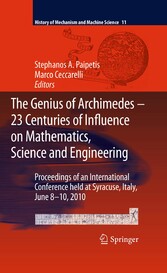Suchen und Finden
Mehr zum Inhalt

The Genius of Archimedes -- 23 Centuries of Influence on Mathematics, Science and Engineering - Proceedings of an International Conference held at Syracuse, Italy, June 8-10, 2010
"5. LEGACY AND INFLUENCE IN SCIENCE AND TECHNOLOGY (p. 346-347)
CROSS-FERTILISATION OF SCIENCE AND TECHNOLOGY IN THE TIME OF ARCHIMEDES
Theodossios P. Tassios Nat. Tech. University of Athens, 4, Ag. Lavras, 15236 Pendeli, Greece ABSTRACT The mutually positive interaction between Science and Technology is first reminded, and the early traces of such a crossfertilisation are sought in Ancient Greece. Subsequently, this phenomenon is examined during the Hellenistic period.
Several technical achievements are found to be inspired by scientific knowledge, whereas Technology did offer to Science some practical ideas and, above all, lots of measuring devices. Within this Alexandrian spirit, Archimedes was educated and has produced his mathematical and engineering works. Some of his inventions, probably inspired by his own mathematical findings, are mentioned. A more detailed analysis is presented on the scientific bases of the archimedean planetarium, admired by Cicero.
Further on, the innovative views of Archimedes are presented on the hybrid demonstration of some geometrical theorems, via both mechanical and theoretical means. Besides, the strange view of Plutarch is critically examined, according to which Archimedes considered as “unworthy and vile” any activity related to machines. In conclusion, this assertion is found to be completely unsupported and arbitrary. Finally, the scientific rationality of the design of machines during the Italian Renaissance is mentioned as a confirmation of the validity of the crossfertilisation process.
1. INTRODUCTION
Empirical Technology appears very early – almost simultaneously with humans (animals too possess their own technology). The subject of this lecture is to examine the ways such a Technology may later on be fertilised by Science, and how Science itself may profit of available Technology; and, more specifically, how such a crossfertilisation has taken place during the 3rd cent. BCE, the period when Archimedes lived and published his scientific work. For this kind of historical investigation, one needs first to understand if such a crossfertilisation is feasible in principle. Subsequently, we need to follow the steps of such a process in Ancient Greece, before the examination of the related phenomena in the time of Archimedes."
Alle Preise verstehen sich inklusive der gesetzlichen MwSt.







